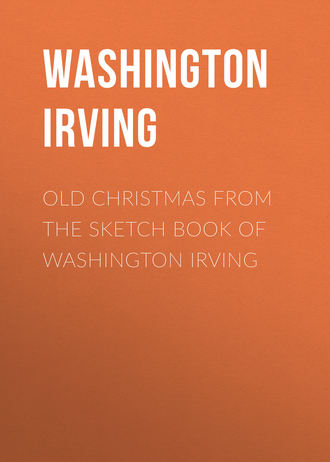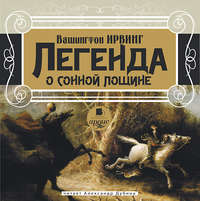 полная версия
полная версияOld Christmas From the Sketch Book of Washington Irving
"An English gentleman at the opening of the great day, i. e. on Christmas day in the morning, had all his tenants and neighbours enter his hall by daybreak. The strong beer was broached, and the black jacks went plentifully about with toast, sugar, nutmeg, and good Cheshire cheese. The hackin (the great sausage) must be boiled by daybreak, or else two young men must take the maiden (i. e. the cook) by the arms and run her round the marketplace till she is shamed of her laziness." —Round about our Sea-Coal Fire.
Note E, p. 129The old ceremony of serving up the boar's head on Christmas day is still observed in the hall of Queen's College, Oxford. I was favoured by the parson with a copy of the carol as now sung, and as it may be acceptable to such of my readers as are curious in these grave and learned matters, I give it entire.
"The boar's head in hand bear I,Bedeck'd with bays and rosemary;And I pray you, my masters, be merry,Quot estis in convivio.Caput apri deferoReddens laudes Domino.The boar's head, as I understand,Is the rarest dish in all this land,Which thus bedeck'd with a gay garlandLet us servire cantico.Caput apri defero, etc.Our steward hath provided thisIn honour of the King of Bliss,Which on this day to be served isIn Reginensi Atrio.Caput apri defero,"Etc. etc. etc. Note F, p. 131The peacock was anciently in great demand for stately entertainments. Sometimes it was made into a pie, at one end of which the head appeared above the crust in all its plumage, with the beak richly gilt; at the other end the tail was displayed. Such pies were served up at the solemn banquets of chivalry, when Knights-errant pledged themselves to undertake any perilous enterprise; whence came the ancient oath, used by Justice Shallow, "by cock and pie."
The peacock was also an important dish for the Christmas feast; and Massinger, in his City Madam, gives some idea of the extravagance with which this, as well as other dishes, was prepared for the gorgeous revels of the olden times: —
"Men may talk of country Christmasses,
Their thirty pound butter'd eggs, their pies of carps' tongues:
Their pheasants drench'd with ambergris; the carcases of three fat wethers bruised for gravy, to make sauce for a single peacock!"
Note G, p. 133The Wassail Bowl was sometimes composed of ale instead of wine; with nutmeg, sugar, toast, ginger, and roasted crabs; in this way the nut-brown beverage is still prepared in some old families, and round the hearths of substantial farmers at Christmas. It is also called Lambs' Wool, and is celebrated by Herrick in his "Twelfth Night: " —
"Next crowne the bowle fullWith gentle Lambs' Wool,Add sugar, nutmeg, and ginger,With store of ale too;And thus ye must doeTo make the Wassaile a swinger." Note H, p. 134"The custom of drinking out of the same cup gave place to each having his cup. When the steward came to the doore with the Wassel, he was to cry three times, Wassel, Wassel, Wassel, and then the chappel (chaplain) was to answer with a song." – Archæologia.
Note I, p. 142"At Christmasse there was in the Kinge's house, wheresoever hee was lodged, a lorde of misrule, or mayster of merry disportes; and the like had ye in the house of every nobleman of honor, or good worshippe, were he spirituall or temporall." – Stow.
Note J, p. 151Maskings or mummeries were favourite sports at Christmas in old times; and the wardrobes at halls and manor-houses were often laid under contribution to furnish dresses and fantastic disguisings. I strongly suspect Master Simon to have taken the idea of his from Ben Jonson's Masque of Christmas.
Note K, p. 156Sir John Hawkins, speaking of the dance called the Pavon, from pavo, a peacock, says, "It is a grave and majestic dance; the method of dancing it anciently was by gentlemen dressed with caps and swords, by those of the long robe in their gowns, by the peers in their mantles, and by the ladies in gowns with long trains, the motion whereof, in dancing, resembled that of a peacock." —History of Music.
1
Poor Robin's Almanack, 1684.
2
Peacham's Complete Gentleman, 1622.
3
See Note A.
4
See Note B
5
See Note C.
6
"Ule! Ule!Three puddings in a pule;Crack nuts and cry ule!"7
See Note D.
8
Sir John Suckling.
9
See Note E.
10
See Note F.
11
See Note G.
12
See Note H.
13
From "Poor Robin's Almanack."
14
See Note I.
15
See Note J.
16
See Note K.









